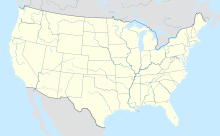The Whitney Museum

Whitney Museum from the High Line in 2015
|
|
| Established | 1931 |
|---|---|
| Location | 99 Gansevoort Street, Lower Manhattan, New York City |
| Coordinates | 40°44′23″N 74°00′32″W / 40.7396°N 74.0089°WCoordinates: 40°44′23″N 74°00′32″W / 40.7396°N 74.0089°W |
| Type | Art Museum |
| Visitors | 350,000 (2013) |
| Founder | Gertrude Vanderbilt Whitney |
| Public transit access |
Subway: Bus: M11, M12, M14A, M14D |
| Website | whitney |
The Whitney Museum of American Art – known informally as the "Whitney" – is an art museum located in Manhattan. It was founded in 1931 by Gertrude Vanderbilt Whitney (1875–1942), a wealthy and prominent American socialite and art patron after whom the museum is named.
The Whitney focuses on 20th- and 21st-century American art. Its permanent collection comprises more than 21,000 paintings, sculptures, drawings, prints, photographs, films, videos, and artifacts of new media by more than 3,000 artists. It places a particular emphasis on exhibiting the work of living artists for its collection as well as maintaining an extensive permanent collection containing many important pieces from the first half of the last century. The museum's Annual and Biennial exhibitions have long been a venue for younger and less well-known artists whose work is showcased there.
From 1966 to 2014, the Whitney was located at 945 Madison Avenue at East 75th Street in Manhattan's Upper East Side. The museum closed in October 2014 to relocate to a new building designed by Renzo Piano located at 99 Gansevoort Street at Washington Street in the West Village/Meatpacking District neighborhoods of Lower Manhattan; it reopened at the new location on May 1, 2015.
Gertrude Vanderbilt Whitney, the museum's namesake and founder, was herself a well-regarded sculptor as well as a serious art collector. As a patron of the arts, she had already achieved some success as the creator of the "Whitney Studio Club", a New York–based exhibition space which she created in 1918 to promote the works of avant-garde and unrecognized American artists. Whitney favored the radical art of the American artists of the Ashcan School such as John Sloan, George Luks and Everett Shinn, as well as others such as Edward Hopper, Stuart Davis, Charles Demuth, Charles Sheeler, and Max Weber.
...
Wikipedia




